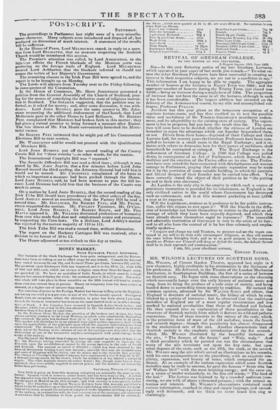MR. WILSON'S LECTURES ON SCOTTISH SONG. MR. WILSON, of Covent
Garden Theatre, appeared last night in a new character, highly creditable to his attainments in the literature of his profession. He delivered, in the Theatre of the London Mechanics Institution, in Southampton Buildings, the first of a series of lectures on Scottish song. He began with some observations on the obscurity which necessarily hangs over the early history of national music and song, from its being the produce of a rude state of society, and being handed down to succeeding times merely by tradition. He noticed the common opinion, advanced by Sir WALTER Score and others, that England is destitute of national music, the fallacy of which he esta- blished by a variety of instances : but be observed that the traditional melodies of England are of a more regular construction and less marked by national pecularities than those of Scotland and Ireland. He then entered into an explanation of those peculiarities in the structure of Scottish melody from which it derives its wild and pathetic expression. One of these consists in the nature of the scale, which, in the primitive form of most of the old melodies, wants the fourth and seventh degrees ; though this peculiarity has almost disappeared in the modernized sets of the airs. Another characteristic trait of Scottish melody is the emphatic introduction of the flat seventh ; which Mr. WILSON illustrated by the beautiful instances of the airs, " The flowers of the forest," and " Waly, waly." And a third peculiarity which lie pointed out was the circumstance that many of the airs terminate not upon the key note, but upon other degrees of the scale, such as the fifth, the sixth, or the second. Mr. WILSON sang the airs which served as illustrations to his remarks with his own accompaniment on the pianoforte, with an exquisite sim- plicity, expression, and beauty of voice, which enraptured the am- dience. As an example of the various expression which some Scottish melodies may be made to assume, he gave the famous " Scots wha has avi' Wallace bled " with the most inspiring energy ; and the same air, as a strain of tender melancholy, to the fine old words, " The land of the leaf." The lecture was listened to by a crowded audience (con- sisting, we are told, of above a thoucand persons,) with the utmost at- tention and interest. Mr. WILSON'S observations contained much curious information, couched in clear and simple language, and exceed- ingly well delivered; and we think we never heard him sing se charmingly.


























 Previous page
Previous page